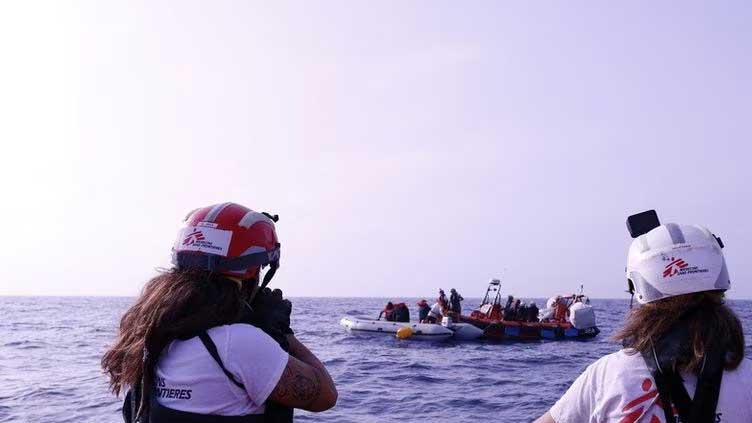Migrant's drowning in Mediterranean prompts criticism of Malta's rescue policies

World
Migrant’s drowning in Mediterranean prompts criticism of Malta's rescue policies
(Reuters) - A passenger on a rubber boat adrift in the Mediterranean Sea called a rescue hotline on June 23 to plead for help. The boat – carrying 14 migrants from the Middle East and Africa – was out of fuel in choppy waters. And a male passenger had just drowned.
The craft was about 70 nautical miles off the coast of Malta, within the small island country’s search and rescue zone, according to position data recorded by Alarm Phone, the hotline operator. Within these zones, countries are obligated under international law to coordinate search and rescue operations.
Still, Maltese authorities declined that distress call and at least 32 other communications about the situation, according to interviews with humanitarian groups involved in the rescue and a Reuters review of the groups’ notes, e-mails and recordings documenting the incident.
At one point, a person who answered the phone at Malta’s Rescue Coordination Centre rebuffed a call from a humanitarian worker regarding the boat. “You’re keeping my line busy,” the responder said, and hung up, according to a recording of the call provided to Reuters by Sea-Watch, a German non-profit search-and-rescue group, one of several that notified authorities about the distressed vessel.
A Maltese military boat did eventually reach the distressed vessel but refused the passengers’ direct pleas for rescue, survivors told interviewers from the medical aid group Médecins Sans Frontières (MSF). An MSF boat, the Geo Barents, later rescued the passengers, a Reuters review of MSF photos and video of the operation shows, and took them to Italy.
The incident is a recent example of Malta’s practice of declining to rescue vessels carrying migrants bound for Europe, according to humanitarian groups and non-governmental organisations operating in the region. The case was particularly troubling, international law experts say, because of the Maltese armed forces’ alleged refusal to aid the passengers.
Details of the incident, described to Reuters by humanitarian groups MSF, Sea-Watch and Alarm Phone, haven’t previously been reported.
By not responding promptly to distress calls and coordinating a rescue, Malta fell short of its duties under international law, said Ainhoa Campàs Velasco, a lecturer in maritime law at the University of Southampton. “The type of boat, the sea conditions, they are overcrowded – this is a clear situation of distress.”
Maltese authorities, including a spokesperson in the prime minister’s office, declined to answer questions about the incident. A spokesperson for Malta’s armed forces, which coordinates search and rescue efforts, said all reports of “irregular migrants” in Malta’s search and rescue zone “are followed up immediately.”
“Search and Rescue operations are coordinated in accordance with the applicable international conventions, regulations and through the competent authority,” spokesperson Sabrina Borg wrote in an email to Reuters. “As with all cases, the competent authorities exercise the duty of care.”
An Italian politician in April accused Malta of failing to rescue boats in distress within the country’s search and rescue zone. Maltese authorities “consistently pretend not to see and never intervene,” leading to more pressure on the Italian coast guard, Tommaso Foti, a member of the ruling Brothers of Italy party, told an Italian radio programme. Foti did not respond to a request for comment.
Humanitarian groups involved in Mediterranean rescues echoed that criticism. “From our experience, it’s highly unlikely that Malta will rescue,” said Oliver Kulikowski, spokesperson for Sea-Watch, which helped in the ultimate rescue of the boat in June. “Malta is trying everything to avoid having responsibility and having people arriving in Malta.”
A home affairs ministry spokesperson said Malta wants a fair and safe immigration and asylum system, in which people “genuinely in need of international protection are swiftly recognized” and those who lack a legal right to remain in Malta are returned to their countries of origin. Malta will continue working to reduce illegal crossings that result in thousands of deaths at sea, said the spokesperson, Neil Azzopardi Ferriggi.
“It is not acceptable that thousands of people continue risking their lives, trying to reach the EU, while smugglers continue profiting from the hopes and misery of migrants,” he said.
‘SCREAMING FOR HELP’
Thirty-nine hours after the first distress call, MSF rescued the three teenagers, two women and eight men who remained on the boat. The aid group collected testimonies from three survivors and shared them with Reuters. The news agency wasn’t able to independently interview the survivors or confirm the full details of their accounts. Their whereabouts are unknown.
The rubber boat left Sirte, Libya, around 3 a.m. on June 21, two survivors told MSF. On board were 14 people from Syria and South Sudan, including two women and three teenagers between 14 and 17 years old.
At 4:28 p.m. on June 22, after a day and a half at sea, someone aboard made a distress call to Alarm Phone, a network that relays distress calls from the Mediterranean to emergency services. Alarm Phone alerted Maltese and Italian authorities by email of the boat’s location, noting that it was out of fuel, according to a copy of the email provided to Reuters.
“The people on the boat are urgently asking for help,” the email said.


